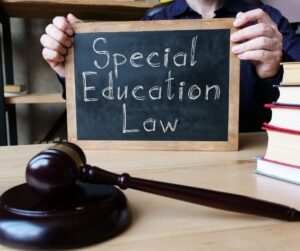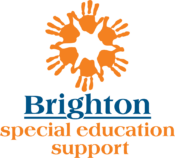The Individualized Education Program (IEP) process is a collaborative and legally mandated process. A team designs an IEP to ensure that students with disabilities receive an individualized education plan that is tailored to their unique needs. In fact, it’s important to note that the IEP process is meant to be collaborative. Moreover, input from all team members, including parents and guardians, should occur over the course of many IEP meetings.
Parents and Guardians play a crucial role in the IEP process. Parents and guardians have the right to ask questions, provide input, and advocate for their child’s needs during the meeting. Their involvement is essential for creating a comprehensive, collaborative, and effective plan for their child.
 Before we dive into parents’ and guardians’ roles, let’s review frequently used special educational terms and acronyms.
Before we dive into parents’ and guardians’ roles, let’s review frequently used special educational terms and acronyms.
Commonly Used Special Education Terms and Acronyms You May See In An Individualized Education Program (IEP) Meeting:
Terms A-E
Accommodations – are tools and procedures that give students with disabilities equal access to instruction, assessment, and help level the playing field for students with disabilities. Accommodations include small group testing and research, oral administration of assignments or tests, a calculator, extra time, and much more.
Admission Review and Dismissal (ARD) – a meeting of a group of people who help to determine whether a student is eligible for special education and develops the Individual Education Program for eligible students (note: the acronym ARD is only used in Texas).
Annual Goals – specific, measurable goals written on the IEP that describe what the student is expected to achieve in the disability-related area(s) over a one-year period.
Annual Review – After your child has received special education services, an IEP meeting is held at least once each year to review your child’s progress. You may request review ARDs as needed throughout the IEP year though.
Assistive Technology (AT) Devices and Services – any piece of equipment, product, or system that is used to increase, maintain, or improve the functional capabilities of a child with a disability.
Autism Supplement – a document to help parents, guardians, and teachers in the development of adequate and appropriate strategies for their child with autism.
Behavior Improvement Plan (BIP) – a plan based on the results of a Functional Behavioral Assessment to address target behavior(s) and goal(s). It will also include positive behavioral interventions and strategies. A BIP receives updates as necessary.
Extended School Year Services (ESY) – are special education program and services provided during July and August. ESY may be recommended for students with disabilities who require special education over the summer to prevent substantial regression.
Terms F-L
Free Appropriate Public Education (FAPE) – Special education programs and related services that are provided at public expense, under public supervision and direction, and without charge to the parent.
Functional Behavior Assessment (FBA) – is a process that is used to identify the reasons for a behavior and the possible interventions to address it.
Individuals with Disabilities Education Act (IDEA) – a federal law that gives students with disabilities the right to receive a Free Appropriate Public Education in the least restrictive environment from age 3 through the end of the school year in which the student turns 21 years or graduates with a high school diploma.
Individualized Education Program (IEP) – documents a child’s eligibility for special education services and formalizes the plan to provide special education programs and services that are appropriate for the child’s unique needs. It is normal for the IEP to receive updates each school year. However, the student’s needs can drive changes at any time.
Least Restrictive Environment (LRE) – your child will be educated alongside his or her non-disabled peers to the maximum extent appropriate.
Terms M-S
Modifications – a change to the content and/or instructional level of the curriculum.
Occupational Therapy (OT) – is a related service designed to help a child maintain, improve, or restore adaptive and functional skills, including fine motor skills and oral motor skills in all educational activities.
Prior Written Notice (PWN) – is a document sent by the school to the parents or guardian informing them of the proposal to initiate or change the identification, evaluation, educational placement of their child. The PWN is not given prior to the ARD. It occurs before the proposed changes are put into effect.
Specially Designed Instruction (SDI) – are adaptations to the content, methodology (pedagogical approaches to instruction), or the delivery of instruction to address the unique needs that result from the child’s disability.
 Now let’s delve into your role as an active member of the ARD committee.
Now let’s delve into your role as an active member of the ARD committee.
Team Collaboration
Collaboration among all team members is essential to develop an IEP that addresses the child’s specific strengths and challenges. Parents and guardians are valuable members of the IEP team. The IEP team will also typically include teachers, special education professionals, school administrators, and sometimes other specialists.
During this collaboration, the team discusses any accommodations or modifications that the student may need to access the curriculum and participate in school activities. This may include adjustments to the way educators deliver instructions or changes to the student’s learning environment.
Advocacy for the Child
Advocacy can span a broad range of actions. It can include expressing concerns and providing relevant information about the child’s abilities. Advocacy can also include actions that ensure the child’s best interests are paramount. Parents and guardians are strong advocates for their child’s needs. They provide unique insights into the child’s strengths, preferences, and areas requiring support.
Sharing Information
The school should actively encourage parents and guardians to share information about the child’s medical history. Additionally, parents should receive encouragement to share developmental milestones. Moreover, parents can share any outside evaluations or assessments that may contribute to a better understanding of the child’s needs. Parents and guardians can provide valuable information about the student’s strengths, challenges, and any changes or developments since the last IEP meeting.
Attending Meetings
Parents should always receive an invite to attend IEP meetings. During IEP meetings, team members discuss and determine the child’s educational goals, services, and accommodations. Attendance allows parents to actively participate in decision-making and contribute to the development of the IEP.
Reviewing and Providing Input
Parents should review drafts of the IEP document and provide input to ensure it reflects the child’s needs and goals. They have the right to request changes to the IEP. Furthermore, parents have the right to have the team inform them about decisions made during the process.
Consent and Agreement
Parents must give informed consent for the proposed IEP. They have the right to agree or disagree with the proposed plan and services. If there is disagreement, parents and the school team may work together to find a resolution. There should also be mechanisms in place, such as mediation or due process, to address disputes.
Monitoring Progress
After the team implements the IEP, parents play a crucial role in monitoring their child’s progress. Regular, ongoing communication with the school team is also essential. Ongoing communication between the school and parents or guardians ensures that the IEP remains effective. It also helps with adjusting the IEP as needed to meet the child’s evolving needs.
 How Brighton Can Help
How Brighton Can Help
In summary, the IEP process is a collaborative effort, and parents bring unique insights and advocacy to the table. Their active involvement is crucial for developing a plan that supports their child’s educational success and well-being.
This is where Brighton Center’s Special Education Consultants can help. We offer a variety of services. For instance, Brighton Consultants provide free training for parents. In addition, Brighton Consultants can serve as a mentor, review your child’s IEP, discuss any concerns with recommendations on next steps, walk you through the ARD meeting process, and attend ARDs to ensure the actions taken are in your child’s best interests.
If you feel you need additional assistance, please submit an inquiry form to contact us.















